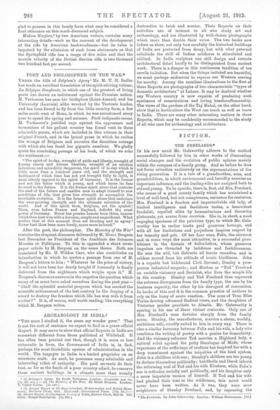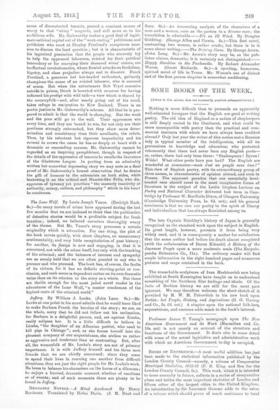FICTION.
THE FREELANDS.•
IN his new novel Mr. Galsworthy adheres to the method successfully followed by him in other works of illustrating social changes and the evolution of publio opinion mainly within the compass of a family group. And as before he does not focus attention exclusively on the representatives of the rising generation. It is a tale of a grandmother, eons, and grandchildren, in which environment and heredity exercise an important influence, and the leading roles are assigned both to old and young. To be specific, there is, first, old Mrs. Freeland, who oomes of a good county family which has maintained a level of well-bred, but not conspicuous, eminence for centuries. Mrs. Freeland is a fearless and imperturbable old lady, of limited intelligence and fastidious tastes, a. benevolent feudalist, repelled alike. by humanitarians and thrusting plutocrats, yet averse from coercion. She is, in short, a most engaging specimen of the patrician type, to which. Mr. Gals- worthy has in earlier books. paid generous homage, and with all her limitations and prejudices inspires respect by her tenacity and grit.. Of her four sons, Felix, the cleverest and in some ways the most- attractive, is a. successful prac- titioner in the domain of belles-lettres, whose generous impulses are thwarted by indolence and fastidiousness. He sees the evil, but distrusts all heroic remedies, and is seldom moved from his attitude of ironic kindliness. John is a capable but. hidebound Civil Servant;. Stanley a pros- perous industrial magnate ; and Morton or "Tod" Freeland an amiable visionary and Socialist, who lives the simple life in the country. Stanley and Tod Freeland thus represent the extreme divergences from the family type, the one by his business capacity, the other by his disregard of convention. In hooks of this sort it is the common. practice of authors to rely on the irony of acute reaction.. The sone of True Blue Tories develop advanced Radical views,. and the- daughters of Victorian prudes gravitate to Alsatia.. Mr. Galeworthy is sparing in his use- of these violent. contrasts. Only one of Mrs. Freeland's sons deviates sharply from the family norm. Stanley, the manufacturer, marries a clever, worldly, ambitious wife, exactly'suited to him in every way. There is also a similar harmony between Felix and his wife, a lady who combines the writing of poetry with a genius for domesticity. And the visionary reformer Tod marries a Highland lady, a natural rebel against the petty Decalogue. of Mode, whose experience of 'the sufferings of crofters has inspired her with a deep resentment against the iniquities of the land system. John is a. childless widower; Stanley's children are too young to declare themselves politically; but Sheila and.Derek inherit the reforming. zeal of. Tod and his wife Kirateen, while Felix's son is orthodox socially and politically, and his daughter only a more impulsive version of himself. If Tod and. his wife had pitched their tent in the wilderness, this novel could never have been written. As it was, they were near neighbours of Stanley Freeland, and, by espousing- the • The Freeland®, By John GaLsworthy, Loudon; Wail= Iieineman% [Gs.] canoe of discontented tenants, proved a constant source of worry to that " shiny " magnate, and still more so to his ambitious wife. Mr. Galsworthy makes a good deal of legiti- mate satirical capital out of the " week-ending " politicians and publicists who meet at Stanley Freeland's sumptuous man- sion to discuss the land question ; but it is characteristic of his ingrained pessimism that the people who sincerely try to help the oppressed labourers, evicted for their political heterodoxy or for marrying their deceased wives' sisters, are ineffectual revolutionaries, whose frontal attacks ou feudalism, bigotry, and class prejudice always end in disaster. Derek Freeland, a generous but hot-headed enthusiast, gallantly champions the cause of an evicted labourer, who is accused of arson. But when the unfortunate Bob Tryst commits suicide in prison, Derek is haunted with remorse for having inflamed his protégé with wild talk—a view which is shared by the countryfolk—and, after nearly going out of his mind, takes refuge in emigration to New Zealand. There is no poetic justice in Mr. Galaworthy's scheme. All that he is pre- pared to admit is that the world is changing. But the weak and the poor still go to the wall. Their oppressors win every time, and they are bound to win, for not only are their positions strongly entrenched, but they show more deter- mination and consistency than their assailants, the rebels. Thus, by his reluctant but rigorous impartiality and his refusal to crown the cause he has so deeply at heart with a dramatic or resounding success, Mr. Galswortby cannot be regarded as an inspiring pamphleteer, though in respect of the details of the oppression of tenants he recalls the literature of the Gladstone League. In parting from an admirably written but somewhat depressing story we may note as a final proof of Mr. Galeworthy's honest observation that he denies the gift of humour to the extremists on both sides, while bestowing it on the critical and Hamlet-like Felix, who dis- approves of tyranny yet practises " the masterly inactivity of authority, money, culture, and philosophy " which in his heart he condemns.



































 Previous page
Previous page